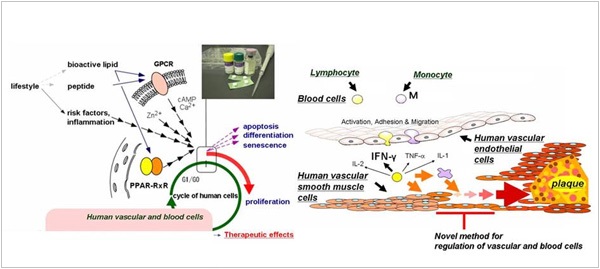Research Institute
Laboratory of Drug Action and Metabolism
In this laboratory, the mechanisms and novel methods for cell fate regulation of human vascular and blood cells are investigated. Cardiovascular diseases such as arteriosclerosis and atherosclerosis, angina pectoris, cerebral and cardiac infarction are closely associated with cell fate control including cell-viability, proliferation, differentiation, inflammation, apoptosis, senescence and their dysfunction in human vascular and blood cells. Therefore, elucidations of the regulatory and pathophysiological molecular mechanisms of control systems for cell fate in the human cells yield information regarding the drug action, metabolism and the target of therapeutic drug discovery.
1. Studies on novel mechanism for cell fate regulation in human vascular and blood cells
Cardiovascular diseases such as arteriosclerosis and atherosclerosis, angina pectoris, cerebral and cardiac infarction are closely associated with cell fate control including cell-viability, proliferation, differentiation, inflammation, apoptosis, senescence and their dysfunction in human vascular and blood cells. Therefore, elucidations of the regulatory and pathophysiological molecular mechanisms of control systems for cell fate in the human cells yield information regarding the drug action, metabolism and the target of therapeutic drug discovery. In these studies, we found that cell surface GPCR (G-protein-coupled receptor (IP)) and nuclear receptor PPAR (peroxisome proliferator-activated receptor (delta)), a regulator of energy metabolism and a key target for obesity and adipogenesis, have important roles in regulation of cell fate in a cooperative and/or competitive manner. We are developing the new methods for regulation of human vascular and blood cells via related signaling pathways. In addition, new antiarteriosclerotic, antiatherosclerotic and antiinflammatory substances and principles for regulation of the activated human cells are also investigated in this laboratory.
2. Investigation of the novel method for regulation of cardiovascular diseases via prevention of monocyte migration
In this laboratory, the novel method for regulation of monocyte migration was also found in the studies on regulation of cardiovascular diseases-related signaling pathway with activating the novel ligand-receptor system. For the innovative prevention and therapy of cardiovascular diseases in effective ways without negative side effects, we are investigating and developing the novel method for prevention of monocyte migration.

Social Contribution (the latest guidance on lifestyle-related diseases and the Ministry of Health, Labour and Welfare guideline "Total Health promotion Plan". )
In this laboratory, new social contribution about THP (the Ministry of Health, Labour and Welfare guideline "Total Health promotion Plan") is possible using the latest results and knowledge obtained in the investigation.
last updated:2021/10/01
